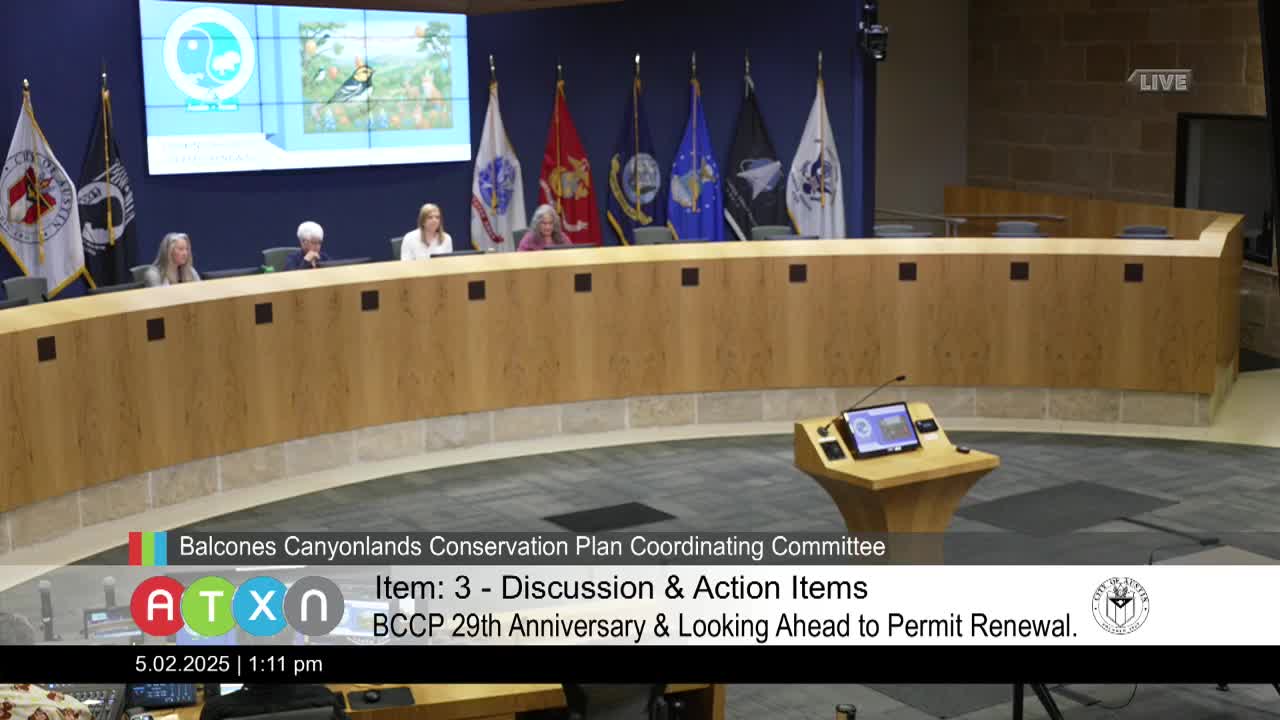Balcones Canyonlands plan enters renewal with changes as 30-year permit nears end
Get AI-powered insights, summaries, and transcripts
Subscribe
Summary
At a meeting of the Balcones Canyonlands Conservation Plan (BCCP) Coordinating Committee at Austin City Hall, BCCP officer Kimberly Harvey said the BCCP is in the final year of the 30-year incidental-take permit originally issued on May 2, 1996, and that recent U.S. Fish and Wildlife Service guidance requires the committee to resubmit the permit as a "permit renewal with changes," including updated biological analyses and NEPA review.
At a meeting of the Balcones Canyonlands Conservation Plan (BCCP) Coordinating Committee at Austin City Hall, BCCP officer Kimberly Harvey said the BCCP is in the final year of the 30-year incidental-take permit originally issued on May 2, 1996, and that recent U.S. Fish and Wildlife Service guidance requires the committee to resubmit the permit as a "permit renewal with changes," including updated biological analyses and NEPA review.
The requirement to file a renewal with changes means the BCCP cannot obtain a simple time extension and must evaluate updates to conform to current Service policy and the best available scientific data, Harvey told the committee. "The BCCP must now resubmit the permit renewal application as a permit renewal with changes on the application option," she said.
Why it matters: the renewal process will determine whether additional species are covered under the BCCP, whether the plan's terms are amended, and how public review and environmental review are carried out. Any recommendations from the renewal process will be returned to the coordinating committee, the Austin City Council and the Travis County Commissioners Court for approval before the Service issues a renewed permit.
Harvey summarized the plan's history and the 2019 strategy that set a two-phase path: a Phase 1 "makeover" to separate the Environmental Impact Statement from the Habitat Conservation Plan, fix errors, improve mapping and online access, and then assess whether additional administrative changes or a permanent amendment are needed. She said both the City of Austin and Travis County have moved to implement the 2019 approach: the city has launched a cross-department endangered-species working group and the county engaged a consultant to evaluate additional species options. The consultant's draft report was released last month and is expected to be presented to the Commissioners Court in the coming weeks, the committee was told.
Harvey said recent regulatory changes to Section 10 of the Endangered Species Act and related Service policies expand application requirements for incidental-take permits. As a result, renewal submittals for the BCCP will require updated biological analysis for covered species and any species listed or under consideration since 1996, public review, and NEPA compliance. She told the committee that the renewal submittals will not be complete by May 2026.
Christina Williams of the U.S. Fish and Wildlife Service confirmed the committee's summary that, once the renewal-with-changes application is uploaded to the Service's e-permit system with the appropriate notification, take coverage can continue past the permit term provided the permittees continue to work in good faith on the renewal.
Harvey emphasized process options for newly evaluated species: adding a species to the BCCP, pursuing a separate incidental-take permit/HCP, a combination of approaches, or no action. She said evaluation is not automatic inclusion and that any changes would be subject to negotiation with the Service and local approvals. The committee was also introduced to recent staff transitions: Council Member Paige Ellis (new coordinating-committee member), Jeremy Hall (assistant director of Travis County Natural Resources) and Olivia Lopez (formerly Habitat Conservation Plan coordinator at the Edwards Aquifer Authority) were introduced as part of continued program leadership transitions.
Administrative items: at the start of the meeting the committee approved the record of decisions for the Nov. 1, 2024 regular meeting; the motion was moved by Commissioner Bridget Shea and seconded by Council Member Paige Ellis and approved unanimously.
Harvey concluded that the renewal process is substantial but an opportunity to modernize the BCCP and reaffirm regional conservation leadership. She said formal NEPA public comment periods and local outreach forums will be used throughout the renewal process and that the committee will provide further details on public-involvement timing once outreach planning is finalized.
Next steps include finalizing a cost-sharing interlocal agreement for consultant support, completing species-evaluation work by county and city teams, and preparing an amended draft BCCP and NEPA analysis to be reviewed by the coordinating committee and then by city and county decision-makers before submission to the Service.
